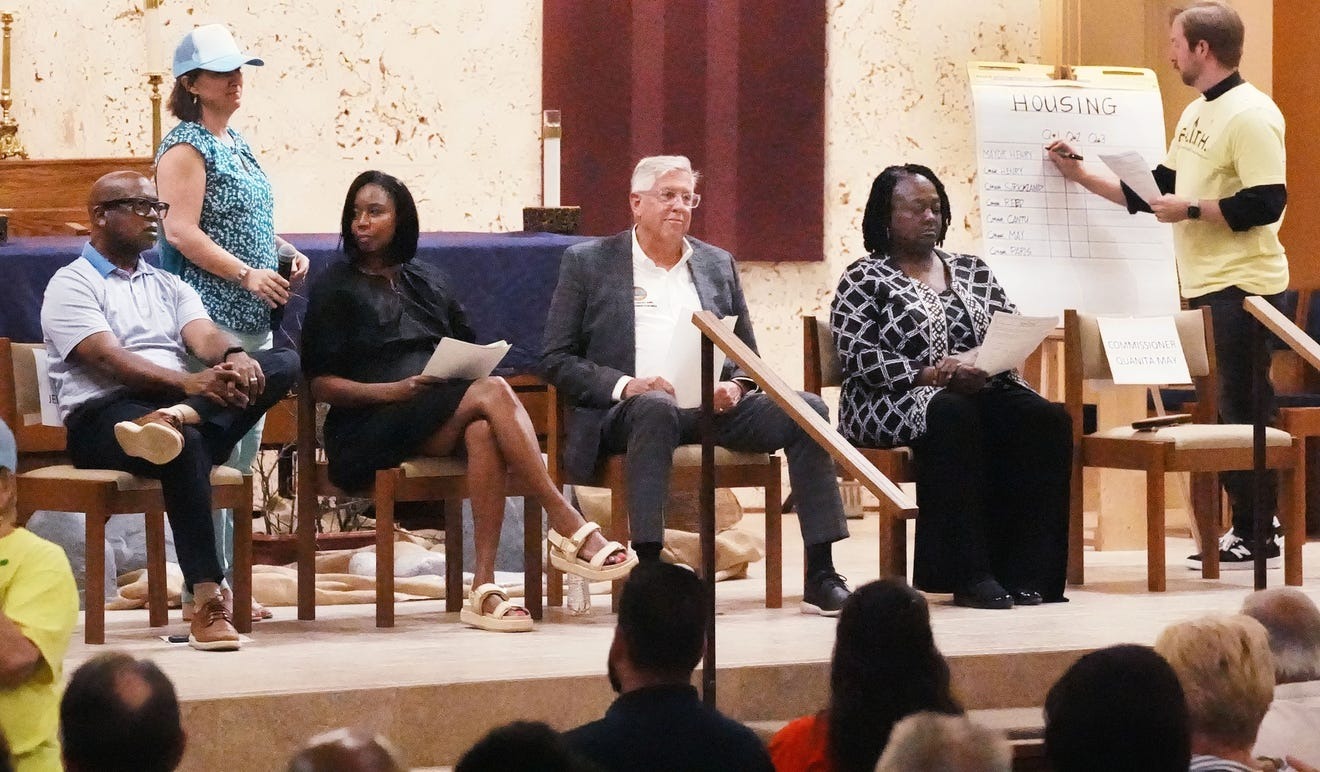By Eileen Zaffiro-Kean, Daytona Beach News-Journal
Many Daytona Beach households can only afford rent between $570 and $1,135 each month, but the city’s median rent is $1,400. To survive, some 40% of city residents pour more than 30% of their income into rent, leaving them struggling to cover all of their other expenses.
Residents in other areas of Volusia County fight the same battle, and it’s been estimated the county could use nearly 55,000 more affordable housing units.
With numbers like those in mind, the FAITH group has been urging the Daytona Beach City Commission and Volusia County Council the past several years to set up affordable housing funds and ongoing sources of revenue to keep the funds well-stocked.
At their annual action rally Tuesday night, FAITH members roared in delight when they heard four Daytona Beach city commissioners standing before them say they would support an affordable housing trust fund continually replenished by linkage fees.
Only one County Council member, Chair Jeff Brower, said he would work with FAITH to create an affordable housing trust fund for the county government.
It was a partial victory for FAITH, a nonprofit interfaith organization made up of 30 diverse Volusia County congregations that has spent the past 25 years pressing local leaders to take action on community problems such as homelessness and healthcare for the uninsured.
Daytona Beach set up an affordable housing trust fund last fall, and it appears a majority of city commissioners will support establishing linkage fees to fill the fund, although at a lower rate than FAITH wants.
Things look much bleaker for the county getting an affordable housing trust fund anytime soon, with Brower and Troy Kent being the only county councilmen who showed up to the FAITH rally at Our Lady of Hope Catholic Church in Port Orange. Other County Council members have more conditional support for a housing fund.
Kent told the roughly 1,400 people packed into the church that he wasn’t comfortable with the way the housing trust would be funded, and that he’s focused now on flood mitigation. Flooding is another top priority for FAITH this year, and Kent and Brower agreed to work with FAITH on that and low-impact development.
How linkage fees work
For years, Daytona Beach city officials have debated how they could provide more affordable housing, and how that could be financed.
Last month, city commissioners moved toward establishing linkage fees, which could be assessed on new construction and then poured into the affordable housing trust fund commissioners set up last year without a funding mechanism. They’re slated to make a final decision on the fees next week.
It was a journey that started a few years ago, when the city hired Strategic Planning Group, Inc., to conduct a workforce housing linkage fee nexus study to determine if there is a reasonable connection, or linkage, between nonresidential construction and the need for housing in Daytona Beach.
Nonresidential development creates a new demand for employees, and requires more employees to construct it – all of whom require housing.
The nexus fee is the amount required to mitigate gaps between employee household income and available affordable housing.
The study recommended the following per-square-foot fees for all new construction, expansion or redevelopment projects of 1,000 square feet or more: Office $23.35; commercial $21.26; residential $18.39; hotel $12.45; industrial $7.22; extended stay hotel $1.23.
City staff, however, is recommending much lower fees to avoid discouraging development: Office $2.20; commercial $1.82; residential $1.58; hotel $1.16; industrial 62 cents; extended stay hotel 11 cents. The fees would be collected upon issuance of a building permit.
FAITH, which is an acronym for Fighting Against Injustice Towards Harmony, wants higher fees.
In 2023, FAITH asked city commissioners for $10 per square foot on residential and commercial development. Last year, FAITH suggested $5 per square foot on both residential and commercial development, and this year the group dropped its request again to $4.25.
The city staff’s recommendation of $1.82 per square foot for commercial development would only produce $1.9 million a year, according to FAITH’s estimate. The $4.25 rate would generate $4.5 million per year, FAITH projects, enough they say to create 156 affordable units a year. FAITH wants to see at least 1,500 new units over the next 10 years.
‘We can break the cycle of poverty’
The Daytona Beach elected officials who came to Tuesday night’s FAITH meeting were Mayor Derrick Henry, City Commissioner Ken Strickland, City Commissioner Dannette Henry and City Commissioner Paula Reed. Not in attendance were commissioners Quanita May, Monica Paris and Stacy Cantu.
The Rev. Phil Egitto, pastor of Our Lady of Lourdes Catholic Church in Daytona Beach, said it was “very disappointing” and “unacceptable” that several city and county elected officials chose not to take part in the rally.
When the mayor and three commissioners at Our Lady of Hope Tuesday night were asked if they would support FAITH’s suggested $4.25 rate, all four said no.
“The amount is important,” the mayor said. “We have to remember we live in a deeply litigious society. So we have to pass something that will meet legal scrutiny.”
If city commissioners vote to adopt linkage fees too high above what city staff is recommending, “the whole shebang will fail,” Henry said.
Strickland agreed it will be better to start smaller.
“Let’s not put too much on at one time,” he said. “Let’s get it on the books instead of blowing it out.”
Brower said affordable housing “is one of the most pressing issues we face.”
“By addressing housing, we can break the cycle of poverty,” said the Rev. Eddie Lake, who serves Allen Chapel AME in Daytona Beach. “FAITH is not going to give up.”
View the original story here.






